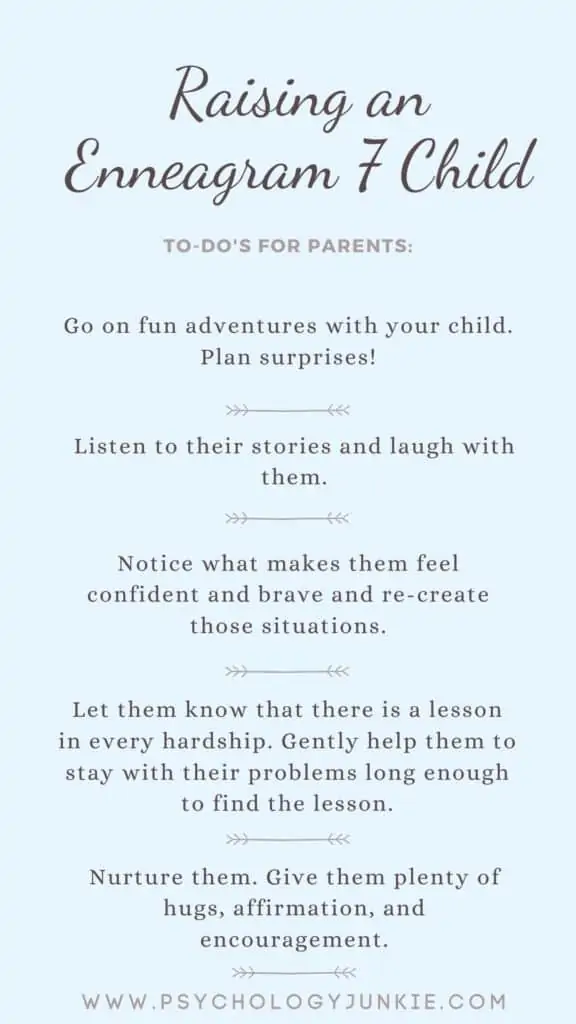The Enneagram Seven Child
Labeled “The Enthusiast,” Enneagram 7 children are recognized by their restlessness, excitability, and creativity. These are the children who always seem to have an eye out for opportunities and fun new games. They may struggle to sit still, but their liveliness and enthusiasm draw other children to them for fun times and memorable experiences.
But there’s more to the 7 than excitability and impulsive energy! Today we’re going to explore a more nuanced look at the Seven as it appears in childhood.

Not sure what your Enneatype is? Take our free Enneagram questionnaire here.
Table of contents
Estimated reading time: 7 minutes
An Overview of the Seven Enneatype:
- Part of the Head triad (along with Sixes and Fives)
- Can have a 6 wing or an 8 wing
- Vice: Gluttony
- Virtue: Sobriety
- Integrates to Five (the Investigator) under growth
- Disintegrates to One (the Perfectionist) when stressed
- Basic Fear: To be trapped or controlled
- Basic Desire: To have the freedom to explore opportunities
Signs Your Child Might Be a Seven Enneatype:
- They like to be in the center of the action
- They are ceaselessly curious
- They are easily distractible
- They like to tell fun stories or jokes
- They easily make friends
- They appear sunny, energetic, and full of good humor
- They have major FOMO (fear of missing out)
- They can be indecisive
- They avoid discussing serious or unhappy topics
- They distract themselves when there is tension
- They love to eat new foods and try new sensory experiences
- They are easily bored if they have to sit still or focus on one thing for a long time
The Strengths of the Enneagram Seven Child:
Sevens are usually able to see the sunny side in any situation. Unlike some types who get bogged down in negative feelings, Sevens often look for the silver lining or a way to re-frame a negative situation in a positive light. Of course, as with all Enneagram types, their strength can also become a weakness. Sometimes they run away from their negative feelings so quickly that they don’t take the time to adequately process them.
Sevens are often fun-loving, adventurous children. They know how to get other kids on board with new ideas and creative play. They’re not usually picky about what they play and are up for trying new things as long as the excitement level stays high and they can innovate or make improvements as needed.
Sevens are often jack’s-of-all-trades. As children, they like dabbling in many different activities and skills, picking up new bits of knowledge every minute. They tend to know a wide variety of facts and bits of information and follow their curiosity down many different exciting new paths. They are usually easy to spend time with because their interests are so varied and they have such a fun-loving, charismatic nature.
Sevens often show others the beauty and opportunity in everyday life that people tend to be blind to. For example, they’ll point out a lush sunset, the fragrant smell of a summer evening breeze, or just how fun it is to balance on a fencepost without falling off. They see ways to “play” just about anywhere and they see stimulating ideas and impressions all around them. Their love of experience tends to be contagious (although it can be a little exhausting to more introverted parents or friends).
The Struggles of the Enneagram Seven Child:
Sevens hate to feel trapped or controlled, and this can show up to their detriment in daily life. For example, they may struggle to sit still at school and cause distractions in the classroom by cracking jokes or fidgeting and squirming too much. They may also struggle to finish tasks that seem mundane like homework or helping out around the house and find distractions to amuse them instead.
Because Sevens distract themselves from pain, they may have a lot of repressed anxieties and frustrations bubbling under the surface of their personality. As they continually avoid their pain, it can show up in spurts of unexpected anger, fear, or impulsive reactions. It can also mean that they learn to run away from difficulties rather than developing patience and struggling through them (and learning maturity in the process). This can develop into a pattern in later life where they quit things when they get hard instead of developing the determination to stick it through. It’s important for parents of young Sevens to gently and consistently give them an outlet to discuss their unfiltered feelings (good and bad). It’s important for parents to gently encourage them to continue their projects, even when they get hard. Learning that boredom isn’t inherently bad is a vital skill that Sevens need to learn (but will likely fight against). That said, it’s important for them to pair that with lots of active playtime and fun.
Sevens as children can develop a strong need for attention and excitement. When things are getting too dull or negative, they may come across as “immature” or more childish than their years in an attempt to get attention – positive or negative. This is especially true for unhealthy Sevens who grow up in dysfunctional families. The healthier the Seven, the less they rely on these tactics. When confronted about bad behavior or disobedience, many young Sevens will charm their way out of punishment or outright lie to avoid feeling trapped or punished.
Because Sevens are often seen as fun-loving and exciting, they usually find it easy to make friends. However, they may struggle to find the kind of depth that is truly rewarding. They often feel like they only have fair-weather friends or that their friends are only there for the fun but can’t allow them to ever be unhappy or serious. It can be frustrating when they’re having a bad day and people expect them to be cheery and exciting all the time. They can feel disconnected from themselves and from others in meaningful, profound ways.
Tips for Parenting an Enneagram 7 Child:

- Go on fun adventures with your child. Learn to let go and be excited with them.
- Listen to their stories and laugh at their jokes, even if they’re childish (hello, they’re children!). That said, don’t feel like you always have to humor them if they’re being too dominating or attention-seeking.
- Give them quiet, constructive activities to do to slow down when life gets dull (for example, if they have to sit still during church or in a waiting room)
- Stay with them when you say good night for a few minutes. Before bed, many Seven children are willing to discuss their struggles and the hard things they’d rather avoid thinking of during the day. Assure them that you are there for them during the dark times and the happy times.
- Teach them to finish what they start. Use incentives sometimes, but not always (sometimes the reward for something is a job well done, not a prize).
- Nurture them. Make sure to give them plenty of hugs, affirmations, and encouragement. Try to notice the good things they do instead of only pointing out the negatives (we naturally notice red flags more than green ones!)
- Remind them, if necessary, to let other kids have the spotlight sometimes.
- Let them know that there’s a lesson in every hardship. Help them to find the lesson instead of immediately distracting them from the hardship. If there’s no lesson, then just be there and try not to pressure them to focus on something else. For example, if your child is crying because they can’t have dessert, instead of distracting them with something else fun, empathize with them, hold them, and let them speak out and process their feelings if needed.
What Are Your Thoughts?
Was this article helpful to you? Do you have any insights or experiences to share? Let us know in the comments!
Find out more about your personality type in our eBooks, Discovering You: Unlocking the Power of Personality Type, The INFJ – Understanding the Mystic, The INFP – Understanding the Dreamer, and The INTJ – Understanding the Strategist. You can also connect with me via Facebook, Instagram, or Twitter!









Thank you. I really needed that. I am also a 7, and the things I find frustrating about myself, I am also frustrated by in my son. I really needed all those reminders and tips to understand him, and be patient.